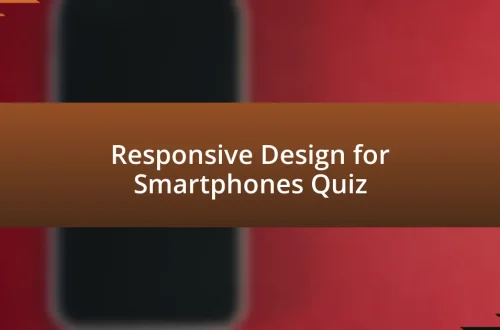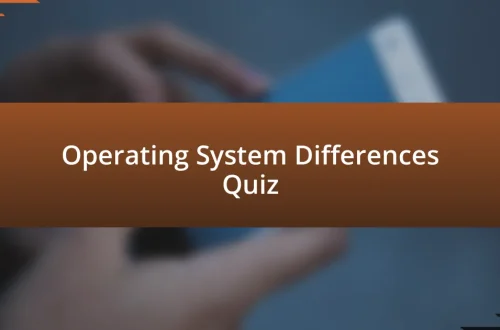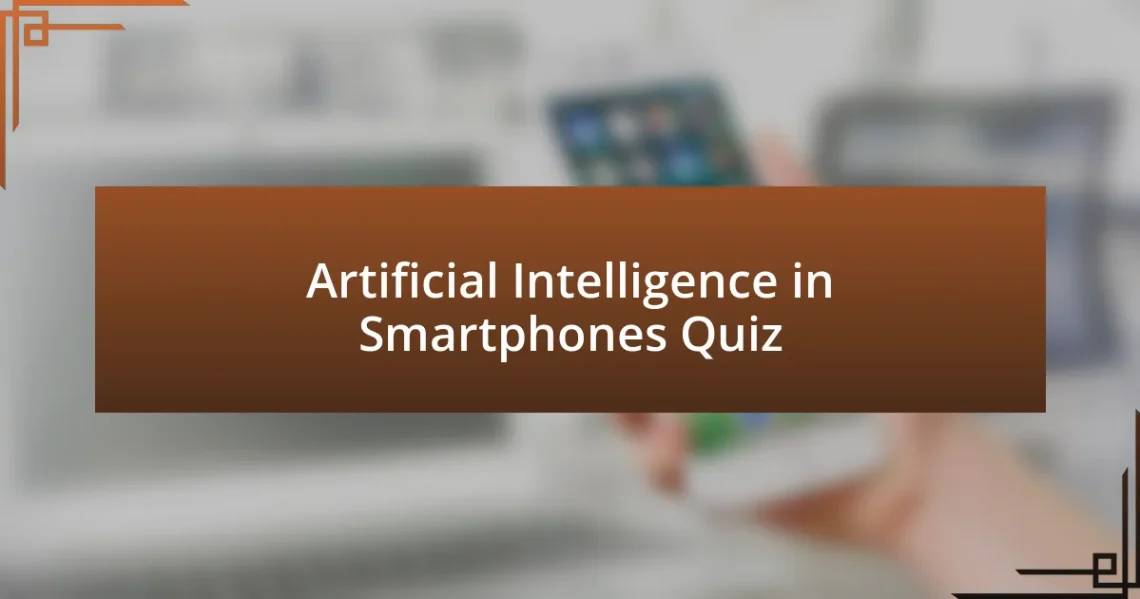
Artificial Intelligence in Smartphones Quiz
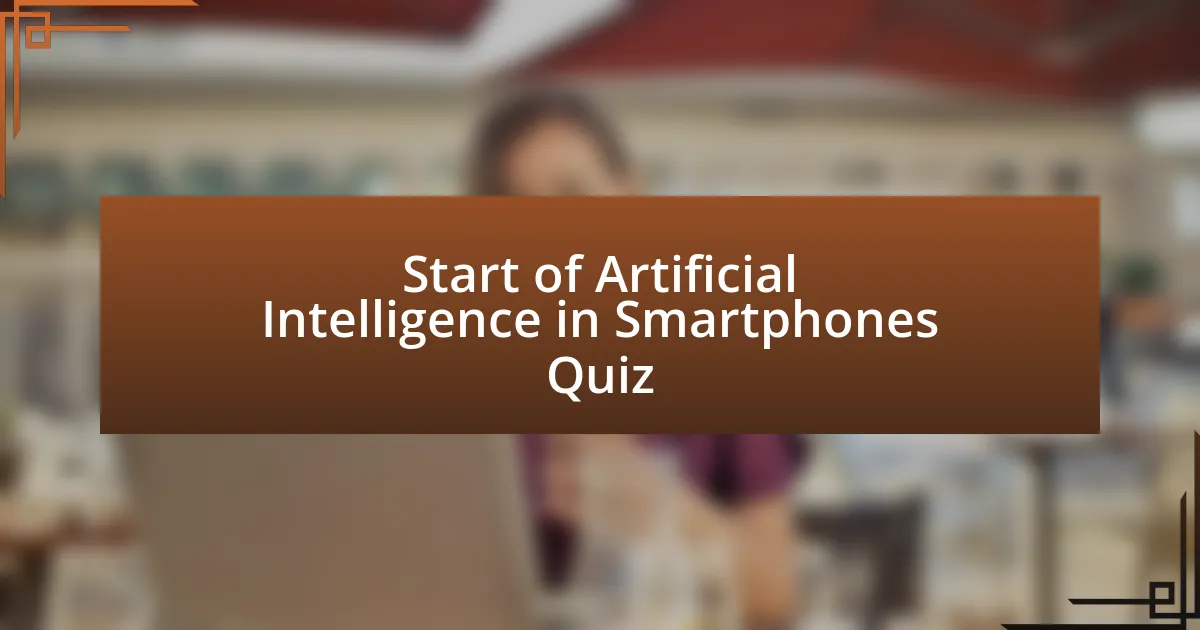
Start of Artificial Intelligence in Smartphones Quiz
1. What is the primary function of AI in smartphone voice assistants?
- To increase the physical durability of the smartphone.
- To enhance voice interactions and provide personalized responses.
- To improve the color accuracy of the display.
- To manage battery life and optimize application usage.
2. How does AI contribute to camera enhancements on smartphones like the Google Pixel 8 Pro?
- Color correction and manual filter application options.
- Enhanced zoom capabilities and lens adjustment features.
- AI-driven camera features like scene recognition, auto-focus, and HDR.
- Improved battery life and system performance optimization.
3. What is one use of AI in optimizing smartphone battery life?
- To manage battery life and optimize application usage.
- To enhance camera image resolution and clarity.
- To provide faster internet browsing speeds.
- To increase the volume and quality of phone calls.
4. How does AI assist in security features like face recognition in smartphones?
- Gesture control using touchscreen only.
- Simple password locks using numbers.
- Voice recognition using text input.
- Face recognition using 3D-depth sensors.
5. What role does AI play in personalizing user experiences on smartphones?
- By controlling device hardware settings automatically.
- By generating app icons for a unique look.
- By limiting access to internet features based on location.
- By learning user behavior and making personalized recommendations.
6. What is the significance of AI in app suggestions for smartphones?
- By increasing the physical size of the smartphone.
- By enhancing battery life through hardware upgrades.
- By automatically updating all apps daily.
- By learning user behavior and making personalized recommendations.
7. How does generative AI influence photo editing features in modern smartphones?
- AI-driven enhancements like automatic editing tools and scene recognition.
- Manual editing options with no automation features.
- Exclusive use of physical camera settings without software aid.
- Only basic filters for photo enhancement.
8. What AI-driven technology enhances navigation on smartphones?
- GPS Navigation
- Music Streaming
- Wi-Fi Sharing
- Camera Filters
9. In what way does AI support real-time language translation on smartphones?
- By converting audio files into video formats instantly.
- By summarizing long texts into shorter paragraphs effortlessly.
- By using neural networks to analyze speech patterns.
- By translating written text into images simultaneously.
10. What is the purpose of AI in improving smartphone speech recognition?
- To improve battery life efficiency.
- To enhance voice interactions and provide personalized responses.
- To increase internet speed and connectivity.
- To change screen colors and aesthetics.
11. How is AI utilized to enhance data encryption on smartphones?
- Enhanced algorithms for encryption.
- Regular software updates.
- Manual user input required.
- Increased hardware speed.
12. What advanced feature do AI smartphones offer for video calls?
- 3D video effects
- Virtual reality backgrounds
- Audio enhancement features
- AI-generated subtitles for video calls
13. How does AI affect the speed of application launches on smartphones?
- It reduces load times through optimization algorithms.
- It disables background processes, making all apps launch faster.
- It makes apps larger and slower to open.
- It requires a manual restart of the phone for faster launches.
14. What role does AI play in context-aware notifications on smartphones?
- AI assesses user context and preferences for relevant alerts.
- AI only filters spam messages for notifications.
- AI prevents all notifications from disturbing the user.
- AI automatically deletes old notifications without user input.
15. How is AI being used to predict user behavior on their smartphones?
- By preventing all background applications from running.
- By analyzing user behavior patterns and making personalized recommendations.
- By randomly changing app settings to surprise users.
- By providing internet access only at certain times.
16. What is a unique AI feature in Samsung`s Galaxy S24 lineup?
- Smart Assistant
- AI Companion
- Virtual Assistant
- Galaxy AI
17. How does AI assist in organizing photos on smartphones?
- By deleting unwanted images automatically.
- By enhancing photos through filters applied automatically.
- By categorizing photos based on content and location.
- By changing the color of photos to match themes.
18. What benefits does AI bring to virtual assistants in terms of scheduling?
- AI can ignore user preferences for scheduling.
- AI can manually schedule all appointments.
- AI can automate scheduling tasks.
- AI can only schedule phone calls, not meetings.
19. How does AI enhance health tracking capabilities in smartphones?
- By enhancing the phone`s physical durability.
- By increasing smartphone battery life significantly.
- By allowing users to play more games on their phones.
- By providing faster and more accurate health data analysis.
20. What AI technology is implemented for improving voice clarity during calls?
- Noise-cancellation technology
- Automated text predictions
- Virtual reality tools
- Gesture recognition systems
21. In what ways does AI analyze usage data to improve smartphone performance?
- By requiring manual updates to improve user experience.
- By analyzing user behavior and optimizing settings.
- By installing unnecessary applications to enhance speed.
- By using random data to change performance settings.
22. How does AI leverage deep learning for facial recognition on smartphones?
- AI utilizes traditional algorithms without learning.
- AI relies solely on 2D images to identify faces.
- AI depends on GPS tracking for facial recognition.
- AI uses neural networks to analyze facial features.
23. What type of AI model helps personalize music recommendations on smartphones?
- Neural Network
- Data Mining
- Recommendation Algorithm
- Sentiment Analysis
24. How does AI contribute to automated content creation on smartphones?
- By generating text and images based on user input.
- By replacing the operating system entirely.
- By shutting down apps based on battery life.
- By limiting access to smartphone features.
25. What innovative use of AI enhances accessibility features in smartphones?
- Touchscreen sensitivity adjustment.
- Gesture-based navigation.
- Text-to-speech integration.
- Automatic app installation.
26. How does AI drive energy efficiency in the latest smartphone models?
- By adding physical features for improved connectivity.
- By increasing screen brightness and resolution options.
- By managing battery life and optimizing application usage.
- By automatically installing updates and new apps.
27. What is the impact of AI on the customization of smartphone interfaces?
- AI solely focuses on increasing the device`s speed without customization.
- AI eliminates the need for user input in customization processes.
- AI restricts customization options to standard interfaces only.
- AI enables personalized themes and layouts based on user preferences.
28. How does AI improve the search functionality within smartphone apps?
- By limiting app access to enhance security.
- By disabling unused features to speed up devices.
- By optimizing battery life for all applications.
- By analyzing user behavior patterns and making personalized recommendations.
29. In what ways does AI assist in filtering spam calls on smartphones?
- By blocking all incoming calls indiscriminately.
- By identifying suspicious numbers and patterns.
- By converting calls into text messages automatically.
- By alerting users about phone battery usage issues.
30. What is a key benefit of AI in facilitating mobile payments?
- Enhanced security through fraud detection.
- Increased reliance on cash transactions.
- Reduced user privacy during payments.
- Slower transaction processing times.

Quiz Completed Successfully!
Congratulations on completing the quiz on ‘Artificial Intelligence in Smartphones’! This journey through various aspects of AI technology in our mobile devices has unveiled many interesting insights. You have likely gained a clearer understanding of how AI enhances user experience, optimizes performance, and improves security on smartphones.
Throughout the quiz, you explored key concepts such as voice recognition, camera enhancements, and predictive text features. Each question challenged your knowledge and encouraged you to think about how these technologies shape our daily lives. This knowledge is invaluable as AI continues to evolve and integrate into smartphones.
We invite you to delve deeper into this topic. Check out the next section on this page, which offers more detailed information about ‘Artificial Intelligence in Smartphones.’ Expanding your understanding will empower you to make the most of these incredible technologies. Happy learning!
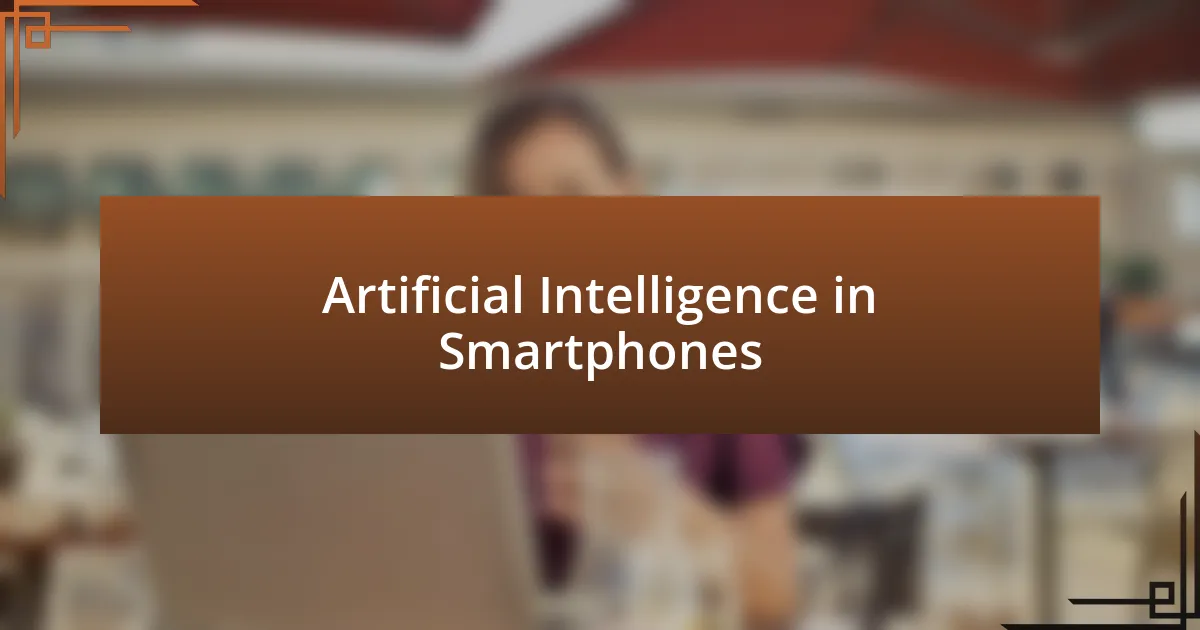
Artificial Intelligence in Smartphones
Overview of Artificial Intelligence in Smartphones
Artificial intelligence (AI) in smartphones refers to the integration of machine learning algorithms and data processing capabilities within mobile devices. This technology enhances user experience by enabling features such as voice recognition, image processing, and predictive text. Advanced AI systems can personalize app recommendations and optimize device performance, making smartphones smarter and more intuitive. Major smartphone manufacturers implement AI to support various functionalities, providing users with a seamless interaction.
AI-Driven Features in Modern Smartphones
Modern smartphones utilize AI-driven features to streamline user tasks. Voice assistants like Siri, Google Assistant, and Bixby leverage AI for natural language understanding, enabling users to command their devices through voice. Furthermore, AI enhances photography by analyzing scenes, adjusting settings automatically, and improving image quality through computational photography. These features exemplify how AI transforms basic functions into advanced capabilities, making smartphones more user-friendly.
The Role of Machine Learning in Smartphone Performance
Machine learning is a subset of AI that plays a vital role in optimizing smartphone performance. It analyzes user behavior to adjust system settings, manage battery life, and improve application loading times. For instance, adaptive brightness adjusts based on usage patterns and lighting conditions. By learning from data, smartphones can allocate resources better, leading to enhanced efficiency and longer usage periods without performance lags.
Privacy and Security Considerations of AI in Smartphones
The integration of AI in smartphones raises privacy and security concerns. AI-based features often require access to sensitive user data. This data collection can lead to vulnerabilities if not managed properly. Furthermore, facial recognition and biometric security rely on AI to process personal data, which poses risks if targeted by malicious attacks. Manufacturers implement encryption and privacy policies to mitigate these risks, ensuring user data remains secure.
Future Trends of AI in Smartphone Technology
The future of AI in smartphones is poised for continuous innovation. Emerging trends include enhanced natural language processing for more intuitive communication and the integration of augmented reality features. AI’s evolution will lead to smarter personal assistants capable of anticipating user needs. Edge computing will also enable faster processing by handling data locally on the device. These advancements promise to make smartphones increasingly integral to daily life.
What is Artificial Intelligence in Smartphones?
Artificial Intelligence in smartphones refers to the integration of advanced algorithms and machine learning techniques that enable devices to perform tasks typically requiring human intelligence. This includes voice recognition, image processing, predictive text, and personalized recommendations. For instance, Google’s Pixel smartphones utilize AI for advanced photography features that enhance image quality by optimizing settings in real-time.
How does Artificial Intelligence enhance smartphone functionality?
Artificial Intelligence enhances smartphone functionality by automating tasks, improving user experience, and personalizing interactions. AI can analyze user behavior to offer tailored suggestions, such as app recommendations or customized news feeds. For example, Apple’s Siri uses AI to understand and respond to user commands, making the device more intuitive and responsive to individual needs.
Where is Artificial Intelligence commonly applied in smartphones?
Artificial Intelligence is commonly applied in various smartphone features, including voice assistants, camera functionalities, and battery management systems. AI in cameras can optimize settings based on scene analysis, while battery management uses AI to learn usage patterns, extending battery life. Samsung’s Bixby and Huawei’s AI photography features exemplify these applications.
When did smartphones start incorporating Artificial Intelligence?
Smartphones began incorporating Artificial Intelligence around the early 2010s, with significant advancements following the release of virtual assistants. Apple’s Siri launched in 2011, marking a pivotal moment for AI in mobile technology. By 2016, AI had become mainstream with the introduction of Google Assistant and improvements in machine learning algorithms.
Who are the leading companies in implementing Artificial Intelligence in smartphones?
Leading companies implementing Artificial Intelligence in smartphones include Apple, Google, Samsung, and Huawei. Apple is known for its Siri voice assistant and A-series chips designed for AI tasks. Google utilizes AI in its Pixel line for camera enhancements and the Google Assistant. Samsung and Huawei have also made significant strides with their respective Bixby and AI-powered photography technologies.


